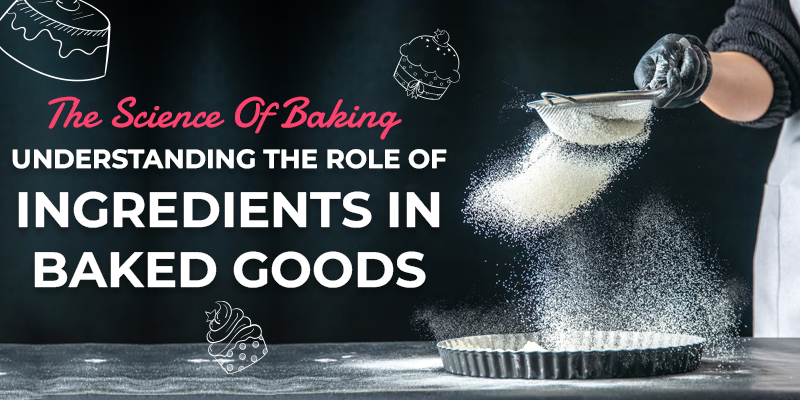Baking is both an art and a science. Many cake baking classes in Chennai usually refer to baking either in the form of creativity and imagination, while the science part of baking is about understanding ingredients’ role in baked goods. Every element in baking has a specific purpose, and understanding the science behind the ingredients can help you create perfect baked goods every time. In this blog, you will explore the role of ingredients in baking and their impact on the final product.
Flour
Flour is the foundation of most baked goods. It is the primary structure source and determines the final product’s texture. The type of flour used in baking can change depending on the recipe, but it is essential to understand the flour’s protein content. The protein content determines the amount of gluten produced when the flour is mixed with liquid. Gluten is a protein that creates the bread’s structure and elasticity.Some of the best baking classes in Chennai say that the high protein flours, such as bread flour, produce more gluten, which is ideal for bread and other yeast-based baked goods. Low protein flours, such as cake flour, have less gluten, perfect for cakes and other delicate baked goods.
Sugar
Sugar plays multiple roles in baking. It provides sweetness, aids in browning, and helps tenderise the final product. Sugar mixed with butter or eggs creates air pockets, giving baked goods a light and fluffy texture. Too much sugar can cause baked goods to be brown too quickly, and too little sugar can result in a dense and dry final product.
Fat
Fat is essential in baking as it provides moisture, tenderness, and flavour to baked goods. It also plays an important role in creating a tender crumb by coating the flour particles and preventing gluten from forming. The most commonly used fats in baking are butter and vegetable shortening. Butter provides a rich and flavorful taste, while shortening produces a more tender crumb. It is important to use the correct type of fat for the recipe, as this can affect the texture and taste of the final product.
Leavening Agents
Leavening agents are ingredients that help baked goods rise. Two main types of leavening agents used in baking are chemical leaveners and yeast.
Chemical leaveners like baking powder and baking soda are used in quick bread and cake recipes. Baking powder combines baking soda and cream of tartar and reacts with liquid to produce carbon dioxide gas, which makes the batter rise. Baking soda, on the other hand, needs an acidic ingredient, such as buttermilk or lemon juice, to react and produce carbon dioxide gas.
Yeast is used in bread and other yeast-based baked goods. Professional bakery courses in Chennai suggest using yeast and these yeasts are an organism that lives and feeds on sugar and produces carbon dioxide gas, which causes the dough to rise. Two main types of yeast are used in baking: active dry yeast and instant yeast. Active dry yeast should be dissolved in warm water before use, while instant yeast can be mixed directly with the flour.
Salt
Salt is often considered a minor ingredient in baking, but it plays a vital role in enhancing the final product’s flavour. It also helps regulate the fermentation process in yeast-based baked goods and strengthens the gluten structure in bread. Too little salt can result in a bland final product, while too much salt can affect the texture and rise of baked goods.
Eggs
Eggs are usually referred to as a versatile ingredient and most of the bakery training in Chennai teaches to use it as a leavening agent, binder, and emulsifier. They provide structure, richness, and flavour to baked goods. Egg whites can be whipped to create air pockets, which makes baked goods light and fluffy. Egg yolks contain fat, contributing to the final product’s tenderness.
In conclusion, professional baking classes in Chennai mention that baking is a fascinating combination of art and science. Understanding the role of each ingredient in baking can help you create perfect baked goods every time. From flour to eggs, every ingredient has a specific purpose, and the right amount and combination of ingredients can make all the difference in the final product’s texture and taste. Whether you are a seasoned baker or just starting, taking the time to understand the science behind baking can help you elevate your skills and create delicious baked goods that will delight your taste buds.


